We may not have the course you’re looking for. If you enquire or give us a call on 800600725 and speak to our training experts, we may still be able to help with your training requirements.
Training Outcomes Within Your Budget!
We ensure quality, budget-alignment, and timely delivery by our expert instructors.
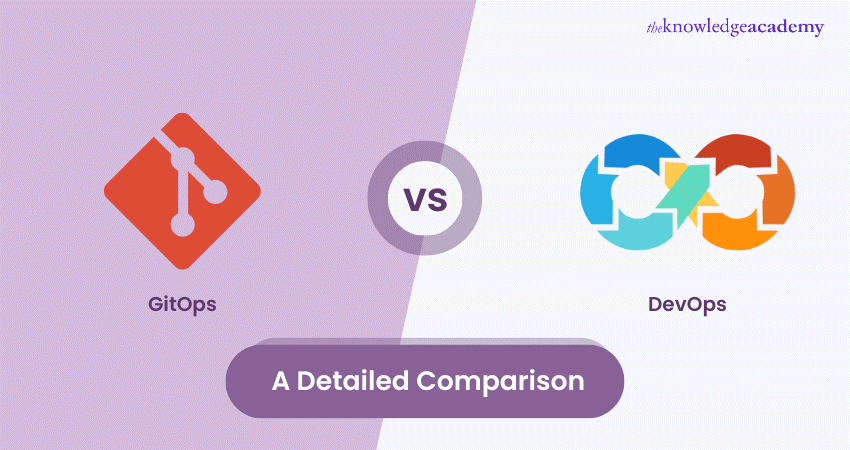
In the debate on modern tech sector, two terms stand synonymous with seamless successful Software Development and delivery - GitOps and DevOps. While the GitOps methodology continues to revolutionise collaboration between Software Development teams, GitOps's Version Control power makes infrastructure management as simple as a Git commit.
But here's the big question: Which one of them truly reigns supreme? This blog takes a stab at the GitOps vs DevOps debate by digging deep into their differences, benefits, synergies and more! So, whether you are a seasoned tech professional or a novice coder, read on and gain insight into the craft of flawless software delivery!
Table of Contents
1) What is DevOps?
2) What is GitOps?
3) GitOps vs DevOps: The Key Differences
4) When to Use GitOps vs DevOps?
5) Synergies between DevOps and GitOps
6) Conclusion
What is DevOps?
Before we dive into the comparison, let's explore what DevOps is. DevOps is a technical and cultural movement that promotes communication and collaboration between development and operations teams. It emphasises the following:
1) Automation
2) Continuous integration (CI)
3) Continuous delivery (CD)
4) Monitoring to shorten the Software Development Lifecycle (SDLC)
5) Increase deployment frequency
6) Ensure application reliability
In DevOps, the focus is on achieving seamless automation and collaboration throughout the Software Development and deployment pipeline.
Key Principles of DevOps
DevOps is a multifaceted approach to Software Development and operations, driven by core principles that encourage collaboration and seamless integration of operations and development teams. Here are the main principles of DevOps:
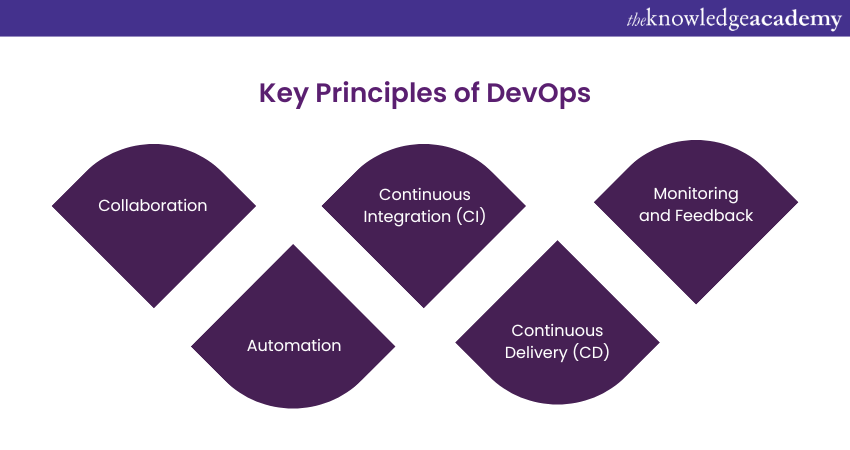
1) Collaboration: DevOps emphasises breaking down traditional silos that separate development and operations teams. It promotes a culture of collaboration and open communication, ensuring that both teams work together closely to achieve common goals.
2) Automation: Automation is a cornerstone of DevOps. It automates manual and repetitive tasks throughout the SDLC and the software deployment lifecycle. This results in reduction of human error, acceleration of processes, and increase in overall efficiency.
3) Continuous Integration (CI): DevOps integrates code changes frequently and consistently. Developers submit their code changes to a shared repository and run automated tests to detect issues early in the development cycle. CI ensures that the codebase is always working.
4) Continuous Delivery (CD): Continuous Delivery extends CI by automatically delivering code changes to staging or production environments, allowing for rapid and reliable deployments. With CD, software is always in a deployable state, and releases can be executed quickly and with confidence.
5) Monitoring and Feedback: Continuous monitoring of application performance and user feedback is essential in DevOps. Monitoring tools and practices provide real-time insights into system behaviour, allowing for rapid detection of issues and the ability to make informed improvements.
These principles form the core philosophy of DevOps. They help organisations to adapt and evolve their practices to achieve faster and more reliable processes.
Benefits of DevOps
DevOps proponents spotlight several technical and business benefits, including:
1) Faster, better product delivery
2) Greater scalability and availability
3) Faster issue resolution and reduced complexity
4) Better resource utilisation
5) Greater automation
6) More stable operating environments
7) Greater visibility into system outcomes
8) Greater innovation
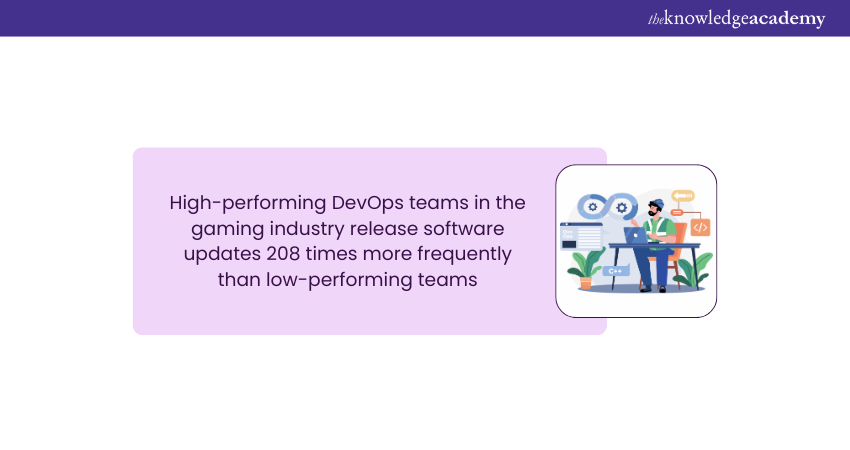
What is GitOps?
GitOps is a relatively new approach to software delivery. It extends some DevOps principles but introduces a distinct set of practices with Git at the heart of it all.
Site Reliability Engineers choose Gitops to enhance system reliability and stability by maintaining infrastructure. GitOps operates on the principle that an application's infrastructure must be declared in Git repositories.
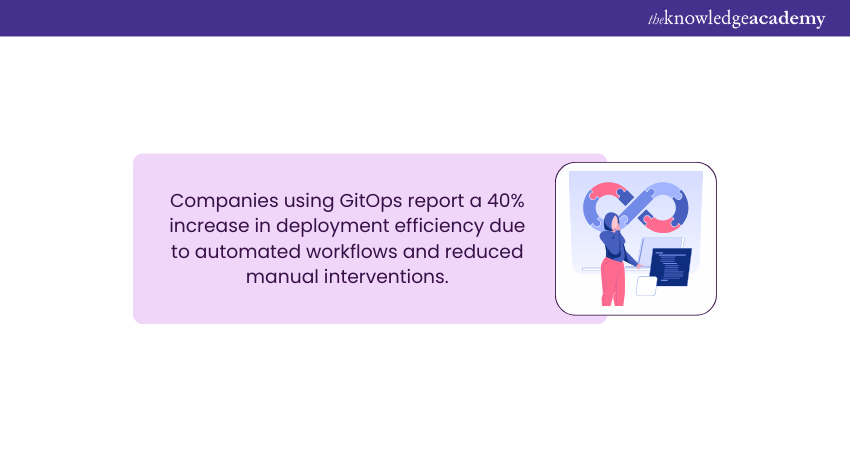
Key Principles of GitOps
GitOps is a modern approach to software delivery and operations that revolves around a set of key principles. These principles define the fundamental tenets of GitOps and guide its implementation. Here are the key principles of GitOps:
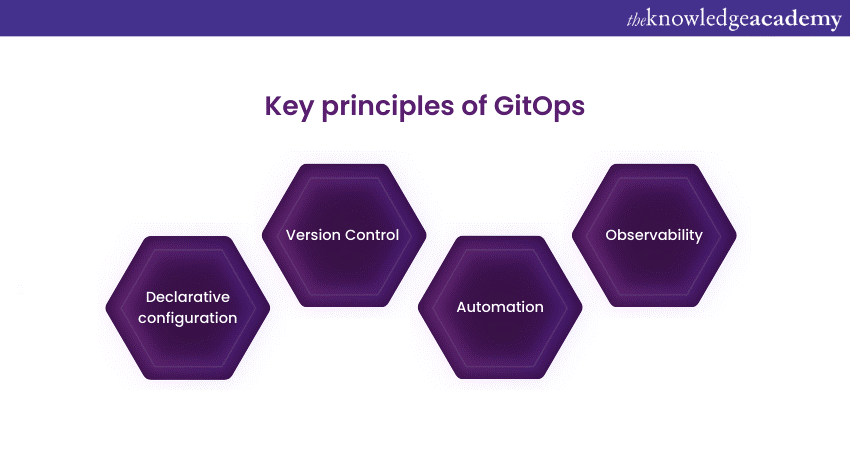
1) Declarative Configuration: GitOps relies on a declarative approach to configuration. All aspects of an application and its infrastructure, including settings, configurations, and policies, are expressed in a declarative format. These declarations are stored in version-controlled Git repositories, often in the form of YAML files.
2) Version Control: In GitOps, version control systems, particularly Git, serve as the single source of truth for the entire system's desired state. This means that everything necessary to run an application, from infrastructure to application code, is defined and stored in Git repositories.
3) Automation: Automation is at the core of GitOps. Automated processes continuously compare the desired state of the system, as defined in Git repositories, with the actual state. Any disparities are automatically identified and corrected, ensuring that the system remains in the desired state without manual intervention.
4) Observability: GitOps places a strong emphasis on observability and monitoring. It involves the implementation of monitoring tools and practices to gain insight into the health and performance of the application. This real-time monitoring allows for quick detection of issues and enables proactive responses.
Benefits of GitOps
Much like DevOps, GitOps comes with its own share of benefits, including:
1) Improved collaboration
2) Increased deployment speed and frequency
3) Increased reliability
4) Improved stability
5) Consistency and standardisation
6) Ease of adoption
7) Greater efficiency
8) More flexibility to experiment
9) More robust security
10) Improved compliance and auditing
Unlock the power of Git with our Git & GitHub Fundamentals Course – Sign up now!
GitOps vs DevOps: The Key Differences
Now that we have laid the groundwork for understanding DevOps and GitOps, it's time to delve into the heart of the matter. These are the key differences that set these methodologies apart. While both aim to streamline the Software Development and deployment processes, they do so in distinct ways.
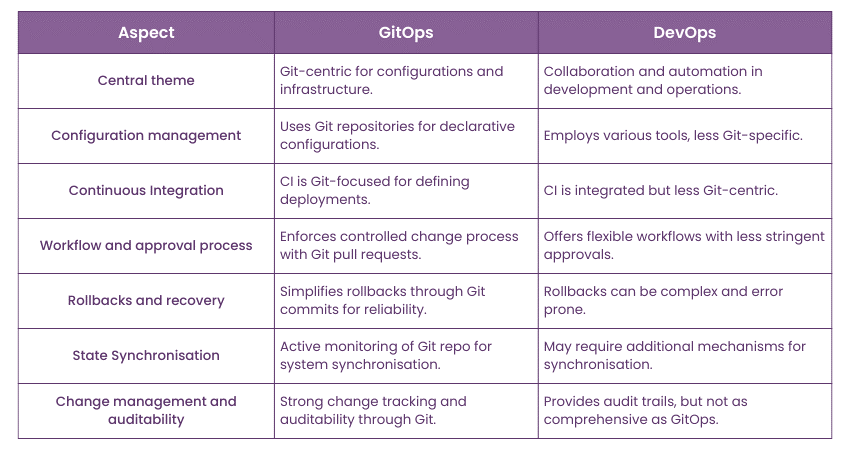
1) Central Theme and Approach
DevOps: DevOps is not a specific technology or tool but a cultural and technical movement. It fosters collaboration, automation, and the integration of development and operations teams. It promotes a cultural shift within organisations.
GitOps: GitOps is a methodology centred on Git. It dictates that an application's entire configuration, desired state, and infrastructure should be declared and stored in Git repositories. It's more tool-specific and Git-centered.
2) Configuration Management
DevOps: In DevOps, configuration management can be accomplished using a variety of tools like Ansible, Puppet, or Chef. These tools are generally agnostic to the version control system in use.
GitOps: GitOps relies heavily on Git repositories to house declarative configurations. All changes are made through Git commits, and automation tools actively synchronise the actual state with the state defined in Git.
3) Continuous Integration and Continuous Delivery
DevOps: As a core component of DevOps, CI/CD puts emphasis on the automation of building, testing, and deploying applications. Common CI/CD tools include:
a) Jenkins
b) Tavis CI
c) Circle CI
d) Harness
e) GitLab
f) Codefresh
g) Azure DevOps
GitOps: GitOps also incorporates CI/CD but puts a strong emphasis on using Git repositories to define the entire deployment process. Tools like ArgoCD and Flux are frequently employed in GitOps CI/CD pipelines.
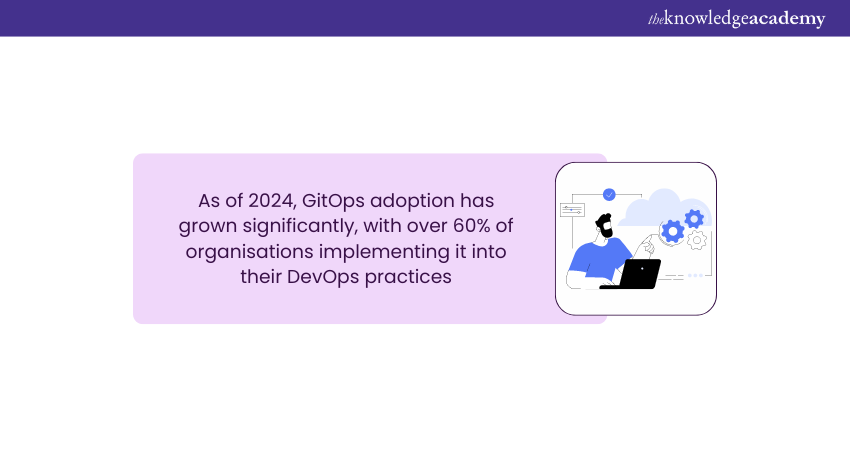
4) Workflow and Approval Process
DevOps: DevOps workflows are highly flexible and can be tailored to fit specific team needs. There is typically no strict requirement for approvals at the version control level.
GitOps: GitOps often enforces a rigorous approval process through pull requests in Git. Changes must go through code reviews and receive approvals before being merged into the Git repository, ensuring a controlled and auditable process.
5) Rollbacks and Recovery
DevOps: Rollbacks in DevOps can be error-prone and complex, depending on the environment's state and the specific CI/CD setup.
GitOps: It excels in rollbacks thanks to its declarative nature. If issues arise, reverting to a previous state is as simple as rolling back to an earlier Git commit. This ensures smoother and more reliable recovery.
6) State Synchronisation
DevOps: DevOps tools may require additional mechanisms to ensure that the actual system state aligns with the desired state.
GitOps: GitOps automation tools actively monitor the Git repository and autonomously synchronise the system to match the declared state, reducing the risk of state mismatches.
7) Change Management
DevOps: Through Git's built-in Version Control, GitOps excels at implementing Change Management Principles and auditability. This makes it easy to track changes and understand who made them and when.
GitOps: GitOps excels in implementing Change Management Principles and auditability through Git's built-in version control. This makes it easy to track changes and understand who made them and when they were made. So, it offers enhanced transparency as well.
In the following sections, we'll explore the scenarios in which you might lean towards one methodology over the other, helping you make a more informed decision about whether to adopt GitOps or DevOps for your specific project.
Fuel your tech evolution and orchestrate innovation with our DevOps Certification Courses – Sign up today!
When to Use GitOps vs DevOps?
The choice between GitOps and DevOps depends on your project's specific requirements and the existing practices within your organisation. Here are some scenarios that can help you decide which approach is more suitable:
When to Use DevOps?
If you are interested in learning when to choose DevOps, then the following criteria may help you. Let's take a look at them below:
1) You Have Established DevOps Practices: If your organisation has already adopted DevOps principles, using DevOps tools and practices might be the logical choice.
2) Your Team Prefers Flexibility: DevOps provides flexibility in tool selection, workflow design, and practices. This can be advantageous when you need customised solutions.
3) You Need Quick Setup and Deployment: DevOps tools can be quicker to set up for small to medium-sized projects, making them suitable for rapid deployment needs.
When to Use GitOps?
If you are interested in learning when to choose GitOps, then the following points may provide some clarity. Let's take a look at them below:
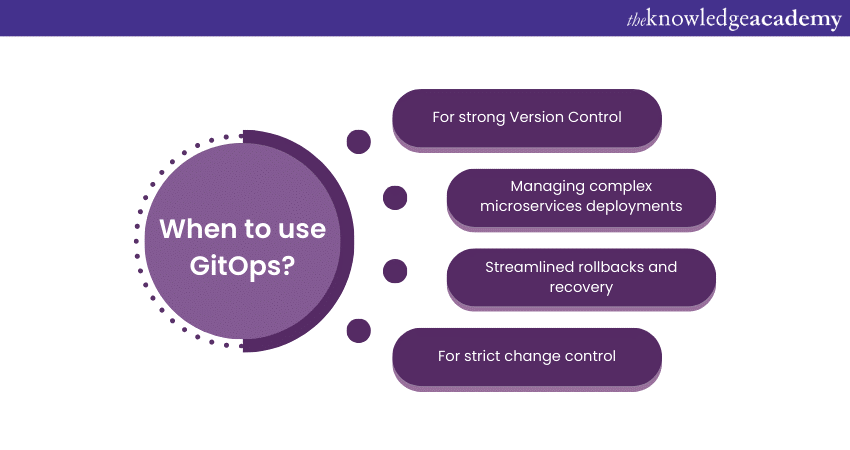
1) You Prioritise Version Control and Auditability: If your project requires strong version control and auditability of changes, GitOps' integration with Git repositories makes it the preferred choice.
2) You Have a Microservices Architecture: GitOps is well-suited for managing complex microservices deployments, where declarative configurations are essential.
3) You Want Streamlined Rollbacks and Recovery: GitOps excels in rollbacks, making it ideal for applications where quick recovery is crucial.
4) You Need Strict Change Control: GitOps enforces a controlled process for changes through Git pull requests, ensuring that all modifications are reviewed and approved.
Synergies Between DevOps and GitOps
Despite their differences, GitOps and DevOps share several common goals and practices, as both aim to accelerate delivery by shortening the SDLC and enabling faster releases. By emphasising improved synergy, both approaches outline the importance of cooperation between development and operations teams. Here are some similarities between the two:
1) Infrastructure as Code (IaC): GitOps and DevOps utilise IaC to manage and provision infrastructure through code.
2) CI/CD Pipelines: Both employ CI/CD pipelines to automate key SDLC processes, including code building and deployment.
3) Automated Testing: By leveraging automated testing, DevOps and GitOps ensure the quality and reliability of code changes.
Conclusion
Having a firm grasp on the differences between GitOps vs DevOps is essential for developers. Both of these are valuable Software Development and deployment methodologies. However, choosing between them comes down to your project's specific requirements, existing practices, and the level of control and auditability you need.
Take the first step in becoming a DevOps expert with our Certified DevOps Professional (CDOP) Training – Sign up now!
Frequently Asked Questions

GitOps is a subset of DevOps that emphasises Git and Infrastructure as code practices. While both GitOps and DevOps increase collaboration and streamline software delivery, their focus, principles, and methodologies can be very different.

Yes, GitOps is a branch of DevOps. It uses Git code repositories to manage application code deployments and infrastructure.

The Knowledge Academy takes global learning to new heights, offering over 30,000 online courses across 490+ locations in 220 countries. This expansive reach ensures accessibility and convenience for learners worldwide.
Alongside our diverse Online Course Catalogue, encompassing 19 major categories, we go the extra mile by providing a plethora of free educational Online Resources like News updates, Blogs, videos, webinars, and interview questions. Tailoring learning experiences further, professionals can maximise value with customisable Course Bundles of TKA.

The Knowledge Academy’s Knowledge Pass, a prepaid voucher, adds another layer of flexibility, allowing course bookings over a 12-month period. Join us on a journey where education knows no bounds.

The Knowledge Academy offers various DevOps Certification Courses including the Certified DevOps Professional Course and the DevOps Engineering Foundation Course. These courses cater to different skill levels, providing comprehensive insights into the Top DevOps Tools.
Our Programming & DevOps Blogs cover a range of topics related to DevOps, offering valuable resources, best practices, and industry insights. Whether you are a beginner or looking to advance your DevOps skills, The Knowledge Academy's diverse courses and informative blogs have got you covered.







 Top Rated Course
Top Rated Course




 If you wish to make any changes to your course, please
If you wish to make any changes to your course, please


